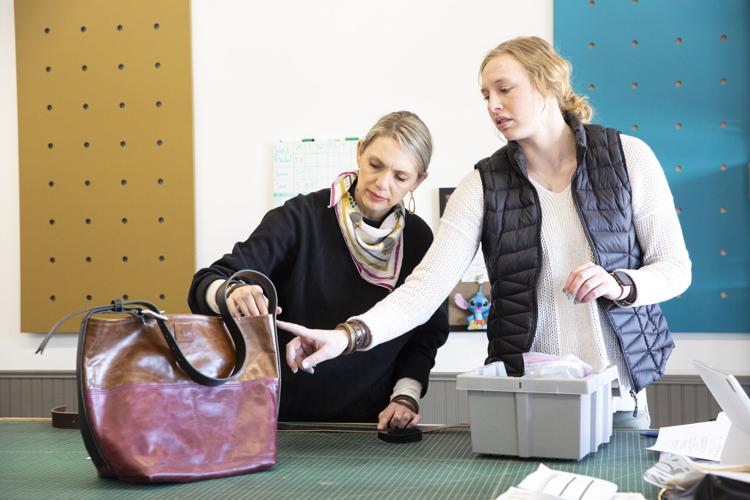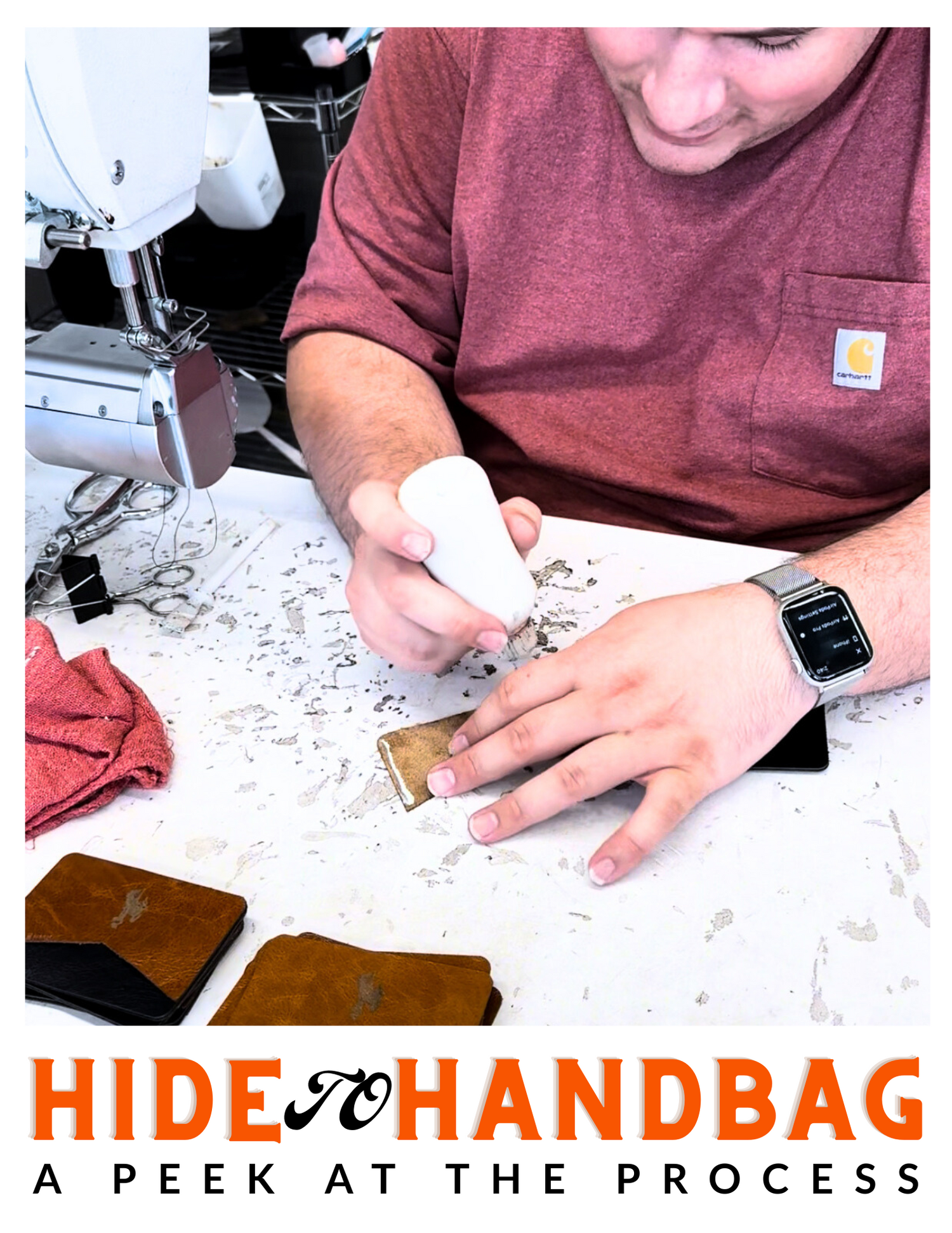Wyoming entrepreneurs get a boost from business accelerator
Carrie Haderlie Wyoming Tribune Eagle Feb 12, 2023
Owner Lexie Garrett, left, and operations manager Sammy Geyer collaborate on a new bag at Alexis Drake in Cheyenne on Wednesday.
Shoulder bags for sale at Alexis Drake in Cheyenne on Wednesday.
Owner Lexie Garrett models accessories and a crossbody bag photographed at Alexis Drake in Cheyenne on Wednesday. The bracelet reads "Say nice things, think nice thoughts," a quote Garret's father used to say to her every day when he dropped her off at school as a child. "It's a daily reminder," said Garrett.
From the left, intern Pixel Mikulich makes belts, seamstress Rachel Allen works at a sewing machine, and owner Lexie Garrett talks with Operations Manager Sammy Geyer in the production room at Alexis Drake in Cheyenne on Wednesday.
Lexie Garrett, owner of Alexis Drake, poses for a portrait in the main product room at Alexis Drake in Cheyenne on Wednesday.
CHEYENNE — Some might say that all you need to start a business in Wyoming is internet and an idea. Others might say you need a great tote, one that can take you from day to night, and all the meetings in between.
But to really grow, a business owner needs access to venture capital, according to Wyoming Microsoft TechSpark Manager Dennis Ellis.
“As a part of this ecosystem we’ve built for entrepreneurs, it is like you can go to a startup competition, you can get a small business grant, but Wyoming was 51st in the country behind Puerto Rico for access to venture capital in our small businesses,” he said.
Microsoft selected sites across the country where entrepreneurs faced specific challenges — think, a transition from an oil and gas economy in Wyoming — and started offering an accelerator program focused on investor development. The broader context for the accelerator, Ellis explained, came from former Gov. Matt Mead’s ENDOW efforts “to build a better entrepreneurial ecosystem.”
“Almost everyone you know works in a small business. And they didn’t have access to funding to do the next step on the ladder, being able to hire new people, scale the operation to grow more jobs,” he said. “What we thought was, what can a community do to invest in themselves? Not wait for someone else to come into the community or recruit some business that is going to save them. What can we do to grow our entrepreneurial ecosystem?”
Participants in gBETA Microsoft TechSpark cohorts have started, grown or expanded 25 operational businesses in the state, said Ellis, who lives in Cheyenne.
“There are quite a few of them, and only one of them has shuttered their business so far,” he said.
Two are particularly unique: luxury handbag company Alexis Drake, located in downtown Cheyenne, and Campground Views, a primarily online company run by a man who calls Sundance home.
Lexie Garrett, owner of Alexis Drake, began her journey making jewelry in college. After a stint in Chicago, a master’s degree program and time as an art teacher in Cheyenne schools, she decided it was time to shift back toward her love of making wearable and functional items. And sometime during that time period, her husband asked why she was carrying a reusable grocery bag as a purse.
Garrett was struck with the idea to create luxury handbags, designing and making them in-house. Her bags are simple, but unique. She calls turquoise a “neutral” and has a line of “everyday” bags that are always in stock, as well as seasonal collections available on a rotating basis.
“Ours feature a different type of construction than other handbags,” Garrett said. “We celebrate the stitching on the outside, and the construction and details that are sometimes hidden. We celebrate that we make them in house. That makes us unique — we design and manufacture all under one roof here in Cheyenne.”
In 2019, Garrett opened her first brick-and-mortar store, and in time moved to her downtown Cheyenne location. Although she was not technically a startup when she joined TechSpark programming, she said she learned a lot.
“The access to the mentors was amazing, and really picking and choosing what we were to go forward with as far as a brand,” Garrett said. “I don’t want to say that there is stuff that is hard to understand — but when you’re knee-deep in the business, you don’t know what is available or accessible. They made it so easy to understand.”
“But I still love the fact that we are able to provide an in-store experience for customers to see our brand and to see what we do,” Garrett said. “People can tour our facility when they are in the Cheyenne location, and just literally walk through and see what seamstresses are working on. That is not something you see very often. I don’t even know how other handbag companies are producing, other than I know that they are producing overseas.”
Mark Koep, owner of Campground Views, said that he participated in the gBETA program, where he found support in his efforts to raise capital, connect with investors and grow his business.
“I’ve done a lot of stuff in the entrepreneurial space, and it was a really good program,” he said.
Koep, who spent over a decade as a full-time RVer before settling down in Sundance, said that the No. 1 problem for people who camp is that they have no idea what they’re getting into when finding a place to spend the night.
“You’re guessing. Campers spend a lot of time online, and, in fact, the data shows they spend an average of two months visiting 78 websites … trying to find a campsite,” he said.
The most obvious solution would be a Google Street View of sorts, but for campsites.
“Let me see the campground. It’s a very visual experience, but nobody has done that,” Koep said. “That was the problem we wanted to solve.”
It wasn’t an easy problem to solve. There was no existing software utilizing video to tour campsites across the nation, so they created it. Compounding the challenges, Koep’s chance to pitch to an investment group came in March 2020, the very day the stock market dropped historically. But by June 2021, Campground Views launched with 143 campgrounds utilizing the virtual tour.
There is “absolutely no reason why Wyoming should not lead in entrepreneurship,” Koep said.
With fiber internet to his house in Sundance, a lower cost of living than other places and a quality of life that is unmatched, he said the state could be a “mecca for people who are outdoorsy and want to run businesses.”
“The only thing you need is internet connection and an idea, and you can make it happen. You don’t need to move to LA to do this. You can do it from where you are at, and what better place to run a business than the state of Wyoming,” Koep said.





